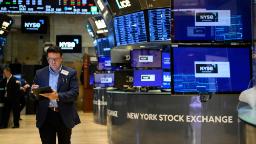[ad_1]

An investing firm named AXS last month launched a series of single-stock ETFs for several popular US companies. AXS gives investors the option to make long bets (i.e. that the stock will go up), or short trades (the stock will go down) on
PayPal (PYPL),
Pfizer (PFE) and
Nike (NKE). AXS also offers short-only ETFs for
Tesla (TSLA) and
Nvidia (NVDA).
Since then, two other firms have launched their own leveraged ETFs in the United States. GraniteShares, which has been trading leveraged ETFs in the UK and Europe for the past few years, now offers long ETFs for
Apple (AAPL) and
Coinbase and long or short ones for Tesla. Direxion has long and short positions for Apple and Tesla.
These investments are inherently risky, and not just because they are tethered to one stock. The funds use what’s known as leverage — investments in complex securities called derivatives — to enhance the bets.
The ETFs are essentially designed to go up or down even more than the underlying stocks they are tracking. But that cuts both ways. When you’re wrong, you’re really wrong. Look at how the Nike short ETF from AXS has done in the past month for example, plummeting 25% while Nike’s common stock has rallied about 12%.
To be fair, the fund companies caution that these ETFs are designed for short-term traders, not long-term investors. They are meant to be held for periods of days — or even hours — as hedges against other positions.
Direxion said in its press release that the funds are “built for sophisticated investors” and “should not be viewed as buy and hold investments, but rather trading tools for traders with a high risk tolerance.” Direxion added that “these ETFs track the price of a single stock rather than an index, eliminating the benefits of diversification.”
And for what it’s worth, the only reason these ETFs are trading in the first place is because the Securities and Exchange Commission approved them. But
not all of the agency’s regulators are on board, citing concerns about the lack of diversification and increased leverage
. Still, in an industry where imitation is the sincerest form of flattery, more of these ETFs are likely on the way. Direxion
filed with the SEC to register bull and bear ETFs for
Netflix (NFLX), Google owner
Alphabet (GOOGL),
Amazon (AMZN) and Facebook parent
Meta Platforms, for example.
GraniteShares
filed for several more leveraged long ETFs, including ones for blue chips such as
Microsoft (MSFT),
Disney (DIS) and
Ford (F) as well as far more volatile stocks including
Peloton (PTON),
Moderna (MRNA),
Uber (UBER) and US-listed shares of Chinese companies
Nio (NIO) and
Alibaba (BABA).
And another fund company named Kurv Investment Management has also
filed with the SEC to list leveraged long and short ETFs focusing on financial and commodity stocks rather than big tech.
Kurv has applied to list long and short ETFs for
JPMorgan Chase (JPM),
Bank of America (BAC),
Goldman Sachs (GS),
Morgan Stanley (MS),
ExxonMobil (XOM) and metals miners
Newmont (NEM) and
Freeport-McMoRan (FCX).
So it looks like investors could soon have the option to make even more high-risk, long and short bets on many companies outside the FAANG universe, throwing caution to the wind.
[ad_2]
Source link
